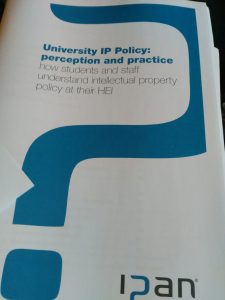 Last week I was invited to the launch of a new report by the Intellectual Property Awareness Network (IPAN). I first heard about IPAN in the context of the report they did a few years ago with the NUS on students attitudes towards copyright and IP. This new report again done in conjunction with the NUS, surveyed around 2800 students and 250 academic staff in UK higher education on their understanding, knowledge and perception of IP policies and it’s impact on their practice (the group were keen to point out that it wasn’t an analysis of the policies themselves). The authors of the report were Professor Ruth Soetendorp (who we first met at the Copyright Education Symposium in June), Steve Smith and Mandy Haberman.
Last week I was invited to the launch of a new report by the Intellectual Property Awareness Network (IPAN). I first heard about IPAN in the context of the report they did a few years ago with the NUS on students attitudes towards copyright and IP. This new report again done in conjunction with the NUS, surveyed around 2800 students and 250 academic staff in UK higher education on their understanding, knowledge and perception of IP policies and it’s impact on their practice (the group were keen to point out that it wasn’t an analysis of the policies themselves). The authors of the report were Professor Ruth Soetendorp (who we first met at the Copyright Education Symposium in June), Steve Smith and Mandy Haberman.
The report was introduced by Sir Ron Aldridge, founder of the Aldridge Foundation, which sets up schools and academies for entrepreneurship. In his opening speech, Sir Ron emphasised how important it was for young people to understand IP in the context of innovation, creativity and when setting up businesses. The report highlights a number of issues, and I have summarised a few of the findings below.
One of the key findings seems to be that when IP policies exist in universities they don’t seem to have an impact on day to day issues of how to manage IP in higher education. Many academics are still unclear what IP is and many students have no idea whether there is any IP in their project work nor how to protect it. It’s also clear that students don’t know who to talk about IP matters. The fact the institution has an IP policy often doesn’t touch many students at all and they only realise later that IP might be significant to their future career.
Most staff claimed to know about IP, but 75% claimed their institution owned student works – so in fact they probably don’t know that much about their institutional IP policy (most policies don’t claim ownership of student work). This suggests the advice of academics might not be sound when speaking to students.
- Institution IP policies need to use plain English and regularly reviewed for correct legal effect.
- Staff understanding particularly about ownership of student IP needs improving.
- Staff IP knowledge and confidence needs improving and there need to be more resources to develop this.
- Where public exhibitions of student work are held there needs to be good practice guidelines to protect students’ IP.
- In terms of IP learning and teaching there needs to be more opportunities for IP teaching across disciplines and we need to identify the best methods for UGs and PGs to learn about IP so they is more consistency in approach across subjects and across institutions.
- IP rights should be expressed in the QAA benchmarks – IPAN are looking to make recommendations it is there as a transferable skill and have already done this successful as part of the QAA Review for Creative Writing.
- Students who do work experience need to know about IP in preparing for this work – they needs to be clear about who owns the outputs they might produce if they work for a company. it is frequently never mentioned.
- IP policies need to written in a comprehensible form to staff and students and need to includes a reference to IP education.
- There need to be adequate and explicit learning opportunities for all students on IP matters in higher education.
The launch of the report was a great opportunity to meet a range of people interested in IP and copyright education. The work also has a direct link with the research we are currently doing to analysis institutional policies towards lecture capture and IP. I highly recommend reading the full report and we hope to get more involved with the work of IPAN. This could involve helping them do some more analysis of the data to try to highlight good practice IP education in the sector, and map this with the work being done by university copyright officers.

1 Comment